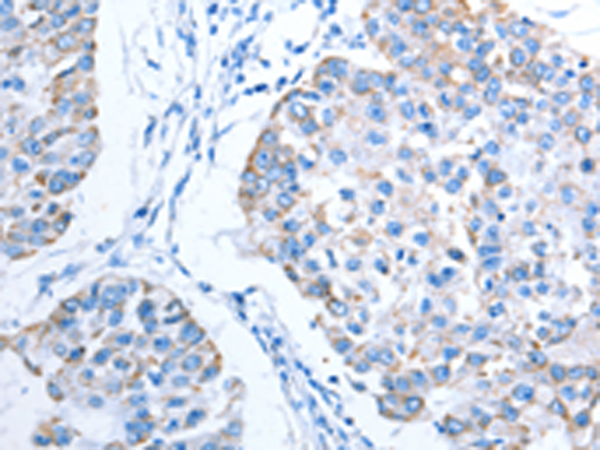
| WB | 咨询技术 | Human,Mouse,Rat |
| IF | 咨询技术 | Human,Mouse,Rat |
| IHC | 1/25-1/100 | Human,Mouse,Rat |
| ICC | 技术咨询 | Human,Mouse,Rat |
| FCM | 咨询技术 | Human,Mouse,Rat |
| Elisa | 1/5000-1/10000 | Human,Mouse,Rat |
| Aliases | ALAS; MIG4; ALAS3; ALASH |
| Host/Isotype | Rabbit IgG |
| Antibody Type | Primary antibody |
| Storage | Store at 4°C short term. Aliquot and store at -20°C long term. Avoid freeze/thaw cycles. |
| Species Reactivity | Human, Mouse, Rat |
| Immunogen | Fusion protein of human ALAS1 |
| Formulation | Purified antibody in PBS with 0.05% sodium azide and 50% glycerol. |
+ +
以下是3篇关于CCL5抗体的参考文献概览,涵盖不同研究方向和疾病模型:
---
1. **文献名称**: *"Targeting CCL5 signaling attenuates neuroinflammation after viral infection"*
**作者**: Smith A, et al.
**摘要**: 研究通过小鼠模型证明,使用抗CCL5中和抗体可抑制疱疹病毒感染后的中枢神经系统炎症反应,降低促炎细胞因子水平,改善神经功能损伤。
2. **文献名称**: *"Anti-CCL5 monoclonal antibody suppresses tumor growth by reshaping the immunosuppressive microenvironment"*
**作者**: Li Y, et al.
**摘要**: 开发靶向CCL5的人源化单抗,在乳腺癌小鼠模型中阻断CCL5与CCR5的互作,减少调节性T细胞(Treg)浸润,增强CD8+ T细胞抗肿瘤活性,显著抑制肿瘤转移。
3. **文献名称**: *"CCL5 neutralization limits atherosclerosis in ApoE-deficient mice via macrophage chemotaxis inhibition"*
**作者**: Zhao H, et al.
**摘要**: 在高脂饮食诱导的动脉粥样硬化模型中,抗CCL5抗体通过抑制单核/巨噬细胞向斑块迁移,减少斑块内脂质沉积和炎症因子IL-6表达,延缓疾病进展。
---
以上研究展示了CCL5抗体在抗炎、抗肿瘤及心血管疾病中的潜在治疗价值。如需具体期刊信息或发表年份,可进一步补充关键词或限定条件。
×